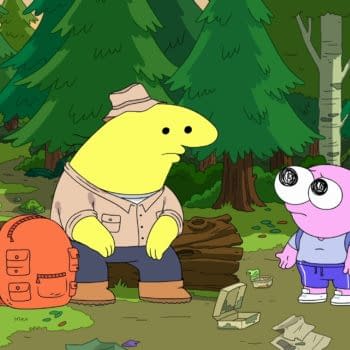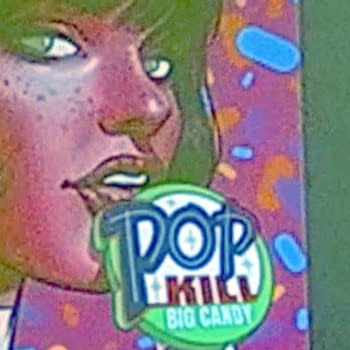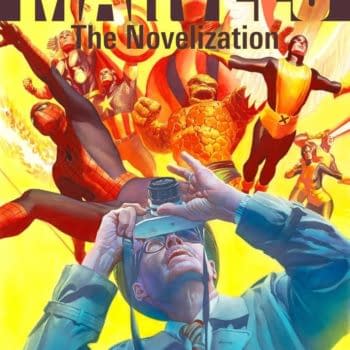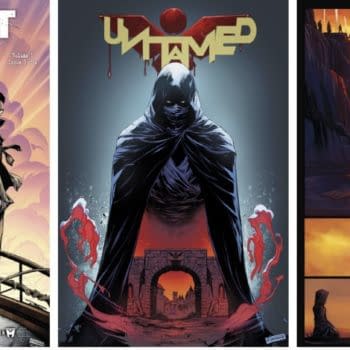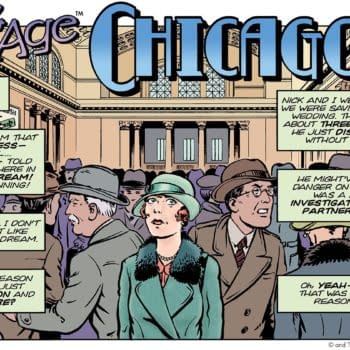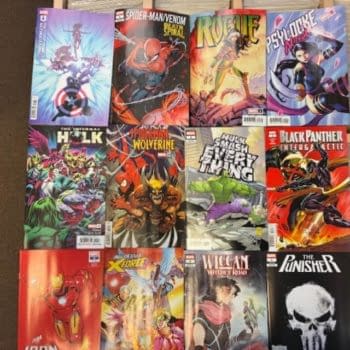Posted in: Comics | Tagged: aspen, Comics, dc, jt krul
JT Krul On A Novel Idea
Alex Wilson writes for Bleeding Cool. He talked to JT Krul at New York Comic Con;
J.T. Krul has written for Marvel to DC to Aspen Comics. Krul has been writing for Aspen since the summer of 2004 when he took over Soulfire at issue 3. He has written Teen Titans along with Green Arrow before Flashpoint along with his early work with X-Men. I had a chance to talk with Krul about his work with Aspen, his upcoming novel, and his thoughts on the New 52.
It's no secret that Aspen puts out many mini-series that accompany their main books. Krul considers the mini series as a way to expand the world and enrich the environment. "The mini series themselves kind of flesh out the world and mythology especially when it comes to Soulfire." Krul also mentioned the fact most of the mini series don't take place in the same time as the main series. They are usually a way to create a more in-depth history.
When approached with the subject of how close to the artist Krul works when it comes to his books, he had this to say. "I work as closely as I can. At the same time you want to let them do their thing so in a perfect world I like to have a conversation with the artist before we even start a volume."
Krul also touched on the subject of writing for artists. " You really want to write to your artist's strengths," says Krul. "You definitely want to make sure you are taking advantage of what they (the artist) have to offer." Krul recommended seeing what your artist is jazzed about drawing and to incorporate their interests into the story to get their highest quality work. It makes sense when you think about it. Comics are a collaborative effort between a writer and artist (and others depending on how many people work on a book) and you want to take in to account the strengths and weaknesses of all parties involved.
Krul also touched on his original series from Aspen, Minefield. He said there were really two elements that inspired that series. "I was doing research for a completely different project, actually a Soulfire story we haven't done yet. I was studying a lot about counter culture in the 1960's in San Francisco. I was reading more about drug experimentation, and the LSD environment."
Krul sited the failed CIA project "MKUltra." For those of you who are not familiar with the highly illegal program, it consisted of using U.S. and Canadian citizens in experiments researching mind control and behavior modification. The people used in these experiments were usually not aware of their involvement.
The other element that inspired the creation of this series spawned from a more modern tragedy in our society, the September 11th attacks. "I kind of just had this notion that in the CIA they have this attitude of 'screw it, we want to know anything that can help us, any tool, any system or methodology that we can do that's going to help us combat the war on terror. We want to exploit it. We don't care how crazy it is.' And I imagined this guy, this agent, walking through the halls carrying theses classified MKUltra program files and is wanting to go and basically dust off this failed program from the 60's and revitalize it with today's pharmacology and try to see if they can develop the ultimate source in wire tapping which would be telepathic agents who could literally read the minds of citizens and the people around them and try to stop terrorism before it even can happen."
Krul also just finished his first novel "The Lost Spark" which he has collaborated with Aspen on. The whole premise to the book is being connected to an item that brings us back to our childhood. Krul calls these items "sparks" in his novel and it's a bit of a commentary on how when we get older, we get cluttered with the more obvious stress of life like facebook, relationships, and bills.
When asked why he decided to attempt a novel Krul said, "I think every writer wants to write a novel." Krul feels that if you want to be a writer then you have to read. If any of us have even taken a class on writing then we were told writing and reading go hand in hand. It's an old adage but it rings true. Krul also told me "It (a novel) is just another way to express yourself. There is something about it being all on you and all your story out there and just about the words on the page." Krul also mentioned that novels allow writers to get more introspective with the characters they are creating. Comics are more visual story telling style but when you just have words on the page it allows writers to become more in-depth with characters.
Krul says the book is geared towards comic fans but also younger readers. He does intend to create a series around this novel and compares it to something around the 4th Harry Potter novel because there are dark elements associated with the novel. "I have plans for further books in the series. There is definitely more world to explore. I'm not 100% sure if the next book I do will be the 2nd volume in that or if it will be another idea that I have that I'm developing right now. The thing about books is that they take a lot longer to write than comic book scripts so the development process is pretty intense."
The book is magical for Krul because of his two children. "I have two girls and there's something about seeing the world through their eyes and being able to watch them explore things for the first time."
Krul has done work for DC and with the reboot of the DC universe people have not been silent about their opinions on the New 52.
"I actually really liked where I was pre-flashpoint," said Krul. "I really enjoyed what was going on with the Green Arrow books. I really enjoyed working on Teen Titans. Those are some of my favorite DC characters and it was a real blast working on those guys."
"The New 52 is fun as well. It's just completely different. You look at the stuff I'm doing with Captain Atom, again, tonally, its very different from what I was doing pre- New 52 and Captain Atom was a very rewarding book for me. It was stretching a little different type of muscle. I actually didn't really consider it more of a superhero book. I more considered it to be almost a Vertigo book in a certain respect. It was more a character piece about a person with God like powers."
"They both had their benefits. They both had their worlds to explore. For Green Arrow I think it was a little more of a transition for me because I went from the way I was doing it before and the direction and what I was trying to do in that book and it did kind of shift gears mid stream when we switched to the New 52 in terms of what the book was and again, they're both really good books, it's just they were both very different tonally especially."
Krul thinks that the New 52 is a good thing because the reboot exposes the books to new readers. "I think that there is a danger in getting caught up in continuity of books where we spend most of our time dealing with continuity issues and trying to explain things as opposed to telling the story. I think the New 52 was about trying to just be able to tell the stories you want to tell." Krul said that a big part of the New 52 was breaking characters down to their core concepts, making them bare bones, and building them from there. He also mentions that the mythology is still there and you're just reading it in a slightly different version.
There have been draw backs to the New 52 and one has hit Krul especially close. "Obviouly not writing Teen Titans any more was hard to take," says Krul. "I really liked writing that book and I did have other ideas for stores in there and the last story was intended to be a few issues longer for the Superboy Prime arc. I had to kind of shorten that down but I was really happy that DC double shipped an issue so we could hit issue 100 before Flashpoint, before it changed over so getting to write issue 100 of Teen Titans was pretty special because Geoff johns started at issue 1. It was a fantastic run and being able to be the one to carry it home through issue 100 was pretty cool."
Krul also mentioned that he was setting up a lot in Green Arrow but due to the New 52 what he was building towards will not be told, or at least in the same way.
Krul currently has three projects in development. He has been with Aspen for ten years and for Aspen's ten year anniversary they are doing a 10 for 10. They are releasing ten new books in 2013 starting in February and the first issue of each book will be $1. Five books will be returning series and the other five will be original new series. Krul says that one of the new books will be an original book by him and more will come out about it in the next few months. Krul is currently working on a lot of original work right now and says, "I'm enjoying world building right now."
A question he gets a lot at conventions and on facebook and twitter is about breaking into the industry as a writer. "It's really tough but you just have to go for it. You have to create comics I mean, that's what they (publishers) want to see. It's easier for an artist, not easy, but easier for an artist to get their art looked at, at shows because editors will look at portfolios and they'll do portfolio reviews so it's kind of easier to get stuff out there. Editors won't look at anything not published by a writer so you pretty much have to self publish it and that's the sad news. The good news is that it's so easy to publish these days in terms of getting your stuff out there whether it's a webcomic or starting a Kickstarter campaign or doing a self published book. The avenues with which to get your stuff out there and also to connect with different artists around the city, around the country, around the world, to find the artist that best works with what you're trying to do. My big advice is just to get it. Do what you can to find an artist that you want to work with that's in the same position you are, that wants to get exposure and will hopefully work for free." Krul recommends crafting a world together and having a joint ownership of the project. "It's about having a joint stake in things."
Many aspiring writers approach Krul at conventions. There is something that he has noticed about them. "The biggest hurtle to over come as a writer, in my opinion, is sitting down and doing the work. I meet a lot of people who want to write but I don't meet as many people who actually write." Krul also says, "If you write a great story and no one ever reads it, that's called a diary." Krul recommends giving your work to others to have a commutative experience.







